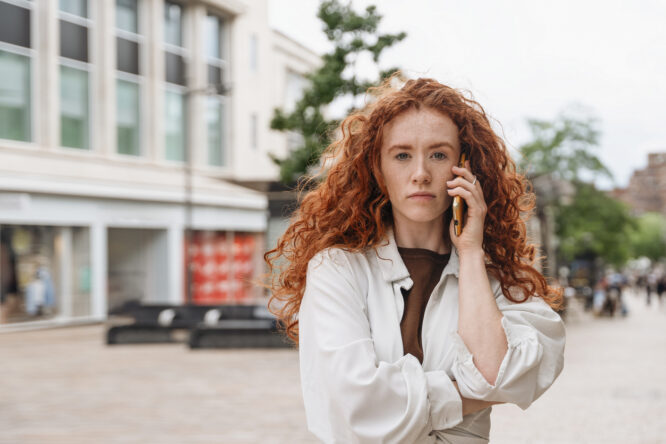People-pleasers don’t just say sorry when they mess up—they say it when they speak up, take up space, have a need, or even exist a little too loudly.

Their apologies aren’t always the result of guilt. In fact, more often than not, they’re caused by fear, habit, and the deep-seated belief that being liked means staying small. Here are the ones that show up most often, and what they usually mean underneath. If you know someone like this (or are one yourself), try to offer a bit of grace and understanding.
1. “Sorry if I’m being annoying.”

This one usually pops up after sending a second message, expressing excitement, or needing a bit more than usual. It’s not about being annoying; it’s about the deep fear that people will lose interest or patience the moment you need anything. People-pleasers often scan for signs of rejection before it even happens. This apology is their way of tiptoeing around connection, just in case being visible leads to being pushed away.
2. “Sorry for rambling.”

Even when they’re telling a completely normal story, people-pleasers will often cut themselves off mid-thought. They worry they’ve gone on too long, taken up too much conversational space, or lost the other person’s attention. This apology comes from a belief that their voice should only take up time if it’s polished, efficient, and perfectly paced. Anything less, and the shame kicks in fast.
3. “Sorry for being so emotional.”

Whether they tear up, get shaky, or just express something that feels too vulnerable, people-pleasers tend to apologise for it. It’s not because they don’t feel it, but because they worry that other people won’t handle it well. They’ve often been labelled “too sensitive” or told to calm down, so now they pre-apologise for their own humanity. Underneath is the hope that maybe, if they soften the impact, it won’t push people away.
4. “Sorry to bother you.”

This line is practically automatic before asking for help, clarification, or even just reaching out. It sounds polite, but it often comes from a place of emotional caution. They’ve learned their needs might be met with irritation or rejection, so they try to soften the request. The apology isn’t about what they’re saying—; t’s about their fear of being perceived as a burden.
5. “Sorry for taking up your time.”

Even in moments where they’re completely entitled to space—like a meeting, a check-in, or a favour that was offered—people-pleasers still feel like they’re asking too much. This apology stems from the belief that other people’s time is more valuable than their own. It’s not humility. It’s a trained instinct to prioritise other people before themselves, even when it’s unwarranted.
6. “Sorry I’m so awkward.”

This is often said half-jokingly, usually in social situations where the person feels out of sync. It’s a defensive move, a way to call themselves out before anyone else gets the chance. People-pleasers often have a deep fear of being rejected for being “too much” or “not enough.” By leading with self-deprecation, they’re trying to keep the room comfortable, even at their own expense.
7. “Sorry I didn’t reply sooner.”

It could’ve been two hours, two days, or just overnight, but people-pleasers panic over the delay either way. They imagine the other person feeling let down, ignored, or secretly annoyed. What this really reflects is how much pressure they put on themselves to always be available. They’re not just trying to stay connected; they’re trying not to disappoint anyone, ever.
8. “Sorry I need to reschedule.”

Even when they have a perfectly valid reason, this kind of apology is usually heavy with guilt. People-pleasers tend to over-explain and overcompensate, trying to convince the other person that they’re not flaky or disrespectful. They’ve internalised the idea that changing plans is a personal failure, rather than a normal part of life. So, every change feels like a potential rupture in the relationship.
9. “Sorry I’m being difficult.”

This line often comes up after asserting a preference, disagreeing, or even just asking questions. It’s rarely actual “difficult” behaviour—it’s usually just the first time they’ve said what they really think. People-pleasers often confuse assertiveness with inconvenience. So they apologise, even when what they’re asking for is entirely reasonable. They just don’t want to ruffle feathers.
10. “Sorry I don’t know how to explain this.”

If their thoughts come out messy or slow, people-pleasers instantly feel like they’ve failed. They fear they’re wasting time, being unclear, or not making sense, and that it reflects badly on them. Instead of giving themselves time to think out loud, they rush to apologise for not being concise or impressive enough. It’s perfectionism meeting anxiety in real time.
11. “Sorry for overthinking.”

This one shows up when they bring something up twice, ask for reassurance, or try to untangle a feeling out loud. It’s said with a laugh or a cringe, but underneath is a worry that they’re exhausting to deal with. They’re trying to manage the other person’s reaction, even while managing their own spiralling brain. The apology becomes a way of saying, “I know I’m a lot right now—please don’t leave.”
12. “Sorry for being a mess.”

When things fall apart—emotionally, logistically, physically—people-pleasers apologise for being anything less than composed. Even when they’re overwhelmed for completely valid reasons, they feel the need to tidy it up with an apology. This doesn’t just come from shame. It comes from the learned belief that being loveable requires being low-maintenance. That meltdown? That missed call? That moment of disarray? They fear it makes them unworthy of care.
13. “Sorry for making this about me.”

They might be mid-sentence, talking about something important, and then suddenly backpedal. They’re not trying to centre themselves; they’re trying not to take up too much of the spotlight. This comes from a belief that their story, their experience, or even just their presence is “too much.” So they undercut it, as if their voice needs a disclaimer before it’s allowed to exist.
14. “Sorry, I didn’t mean to upset you.”

This apology isn’t always wrong, but when it’s reflexive, it’s usually about keeping the peace at all costs. Even when they had every right to say what they did, they backpedal as soon as emotions get tense. They’re not trying to avoid accountability. They’re trying to avoid abandonment. If someone gets upset, their first instinct is to patch things up, even if it means silencing themselves.




